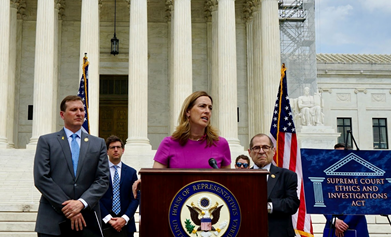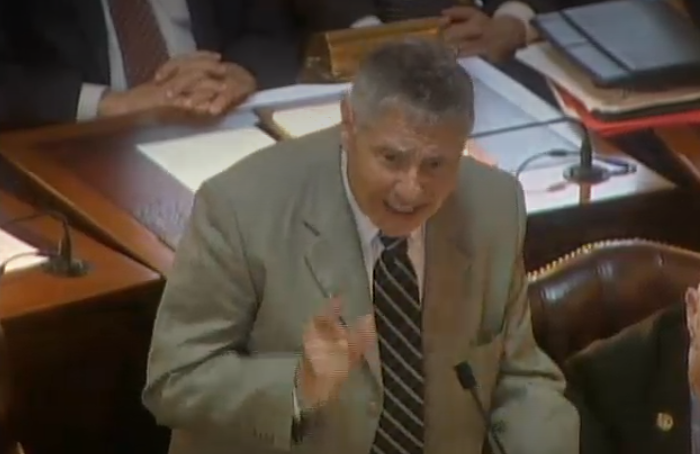
WATCH: Sherrill Speaks at the Supreme Court
Congresswoman Sherrill, a former Assistant U.S. Attorney and Navy veteran, introduced the Supreme Court Ethics and Investigations Act. This bill spearheaded by Sherrill and her Democratic colleagues aims to restore public trust in the Supreme Court and comes in direct response to recent, high profile ethical scandals at the Court, including by Justices Clarence Thomas and Samuel Alito.
The legislation would establish a dedicated investigative body and ethics counsel within the Supreme Court that would provide transparency and accountability through exhaustive investigations into alleged ethical improprieties and reports to Congress on its findings.
“Our Supreme Court Justices take the same oath that I took when I first entered the Naval Academy at age 18: to bear true faith and allegiance to our Constitution. But it’s become clear that certain members of the court have abandoned that oath to serve not our country and Constitution – but their own personal, political interests,” said Rep. Sherrill. “After flagrant ethics violations from Justices Thomas and Alito, it’s time for Congress to bring accountability and oversight to the bench. That’s why I’m proud to help introduce The Supreme Court Ethics and Investigations Act to establish real ethics counsel and oversight for Justices and restore public trust in our nation’s highest court.”
You can watch Sherrill’s remarks here.
The Supreme Court Ethics and Investigations Act:
- Establishes an Office of Ethics Counsel within the Court to advise justices on ethical matters
- Provides ethics training and advice to justices and their spouses through dedicated ethics counsels
- Establishes an Office of Investigative Counsel within the Court to probe potential instances of ethical impropriety by justices and report to Congress on compliance
- Provides Congress the ability to submit ethics complaints to the Office of Investigative Counsel and delivers reports on those complaints in a timely manner
Following recent reporting of ethical lapses from Supreme Court Justices, public trust in the Court has eroded to historically low levels. Most recently, it was reported that Supreme Court Justice Samuel Alito had – on two separate occasions – displayed political symbols at his properties. One of the symbols – an upside-down American flag – is closely associated with the ‘Stop the Steal’ movement, and its display poses a clear conflict of interest, yet Justice Alito has refused to recuse from cases related to the January 6 attacks on the Capitol or the 2020 election. The other – an ‘Appeal to Heaven’ flag – which flew outside Justice Alito’s New Jersey beach home, was carried by insurrectionists on January 6th and is closely associated with right-wing Christian nationalist movements. Sherrill has been an outspoken critic of the Justice’s association with these political symbols.
Earlier this year, it was revealed that Justice Thomas failed to disclose gifts and travel from political activist Harlan Crow with at least one trip valued at over $500,000. Reports have also revealed that Crow bought properties from Justice Thomas and his relatives for at least double what Justice Thomas had said those properties were worth. Justice Thomas’ family received up to $750,000 in income yearly from a firm that has not existed since 2006.
In response, Congresswoman Sherrill pressed Chief Justice John Roberts to establish an ethics counsel and independent investigative body to adopt the same common sense ethics standards that apply to all other federal judges throughout the country.
Additionally, it was reported that Justice Alito accepted extravagant gifts from major conservative donors including Paul Singer, a hedge fund billionaire who has repeatedly asked the Court to rule on his business dealings. The allegations that Justice Alito accepted a paid-for vacation that totaled hundreds of thousands of dollars from Leonard Leo, who had recently played a significant role in Justice Alito’s confirmation process, further serve to undermine the legitimacy of the court.
Congresswoman Sherrill prosecuted federal cases and advised law enforcement on investigations as an Assistant United States Attorney in the District of New Jersey. She also served as an Outreach and Re-Entry Coordinator who created programs to develop trust between law enforcement and the communities they serve.
(Visited 5 times, 5 visits today)
In recent years, the Supreme Court has come under increased scrutiny for its lack of accountability and transparency. Many Americans have expressed concerns about the influence of special interests and political biases on the decisions made by the highest court in the land. In response to these concerns, Chief Justice John Roberts has taken steps to restore trust in the Supreme Court and ensure accountability among its members.
One of the key initiatives taken by Chief Justice Roberts is the establishment of a code of conduct for Supreme Court justices. This code outlines ethical guidelines that justices must adhere to in order to maintain the integrity of the court. It includes provisions on conflicts of interest, recusal procedures, and financial disclosure requirements. By holding justices accountable to these standards, Chief Justice Roberts hopes to prevent any appearance of impropriety or bias in the court’s decisions.
Additionally, Chief Justice Roberts has implemented measures to increase transparency in the Supreme Court’s decision-making process. One such measure is the live streaming of oral arguments, allowing the public to observe proceedings in real-time. This move towards greater openness is aimed at fostering public trust in the court and dispelling any perceptions of secrecy or elitism.
Furthermore, Chief Justice Roberts has taken steps to address concerns about the politicization of the Supreme Court. He has emphasized the importance of judicial independence and impartiality, urging justices to base their decisions on the law rather than personal or political beliefs. By promoting a commitment to the rule of law, Chief Justice Roberts aims to ensure that the Supreme Court remains a fair and impartial arbiter of justice.
Overall, Chief Justice Roberts’ efforts to enhance accountability and restore trust in the Supreme Court are commendable. By implementing ethical guidelines, increasing transparency, and promoting judicial independence, he is taking important steps towards ensuring that the court upholds its role as a bastion of justice in our democracy. It is crucial that these initiatives continue to be upheld and strengthened in order to maintain public confidence in the Supreme Court and preserve the integrity of our legal system.



